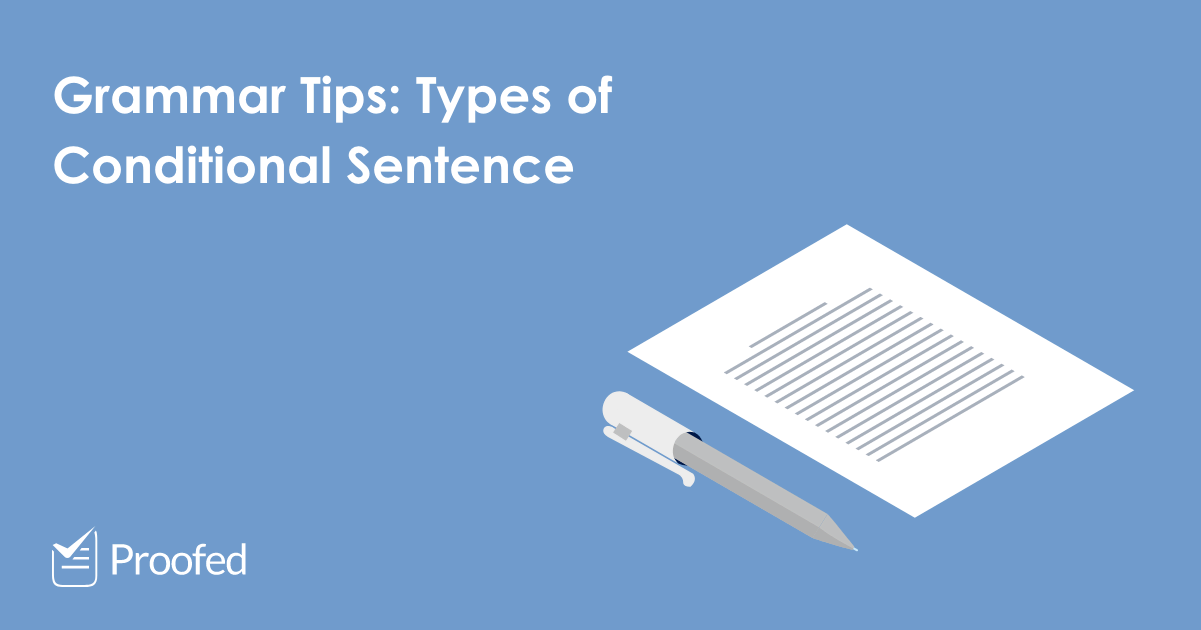Results for “grammar tips”
Search

4-minute read
Grammar Tips: Understanding Conditional Sentences
We use conditional sentences to talk about hypotheticals (i.e., things that might happen). These sentences have two parts: a conditional clause, which usually contains a word like “if,” and a consequence. They also come in four main types, each expressing something different. For instance: Conditional Type Usage Type zero General...

3-minute read
Grammar Tips: What Are Modal Verbs?
Modal verbs are a special category of verb in English. But how do they work? And how should you use them in your writing? In this post, we explain the basics. How Are Modal Verbs Used? Modal verbs are a type of auxiliary verb. These are “helping” verbs that work...

3-minute read
Grammar Tips: What Are Prepositional Phrases?
The term “prepositional phrase” describes a group of words that contains a preposition (e.g., on or after) and modifies a noun or a verb. In this post, we explain how to use prepositional phrases correctly in your writing. What Is a Prepositional Phrase? A prepositional phrase always contains a preposition...

4-minute read
Grammar Tips: Tautology
Tautology is the needless repetition of a word, phrase, or idea. The word, first used in 1566, comes from the ancient Latin and Greek word “tautologia,” meaning the saying of the same thing twice. Here are some common examples of tautology in everyday language: PIN number PIN means “personal identification...

3-minute read
Grammar Tips: Progressive Aspect
You probably know that the English language has three tenses (past, present, and future), but did you know that, for each of these tenses, there are four different aspects (simple, perfect, progressive, and perfect progressive)? The simple aspect of each tense describes actions, facts, and habits, but it can sound...

3-minute read
Grammar Tips: Defining vs. Non-defining Clauses
What Are Clauses? At its most basic, a clause is a grammatical unit that contains a subject and a verb. Clauses differ from sentences (which always contain at least one clause but usually contain more) and phrases (which do not have both a subject and a verb). What Are Defining...

2-minute read
Grammar Tips: What Are Conjunctive Adverbs?
A conjunctive adverb, otherwise known as a subordinating adverb, is an adverb that connects two clauses. And while they play an important grammatical role, punctuating them can be a little tricky (at first!). In this post, we’ll discuss how to use conjunctive adverbs in your writing and the correct way...

4-minute read
A Simple Grammar Guide to Subordinating Conjunctions
...can be difficult to understand and use properly, and subordinating conjunctions are no exception. However, with time and practice, you too can feel confident when using them in your writing or speech. Be sure to check out our Grammar Tips articles to learn about other tricky grammar rules in English....

5-minute read
The Full List of Alternatives to Grammarly for Google Docs
...a fraction of what you’d pay with Grammarly. Pros: It checks for grammar, style, concision, readability, and dialect issues for an affordable price. Cons: There’s no free version, but there is a free trial. Zoho Writer Zoho Writer is a free tool that highlights issues with grammar, spelling, punctuation, readability,...

3-minute read
How to Check Your Grammar Online for Free
...But if you have to pay to use them for every little email or correspondence, the cost can quickly add up. Luckily, there are free alternatives. Read on to learn about some of them. Grammarly As one of the most popular grammar checkers, Grammarly uses an AI-based text checker to...

9-minute read
The 10 Most Common Grammar Mistakes
Whether you’re learning English online or in person, you’ve likely experienced trouble with grammar at some point. As a student, it can be frustrating when your teacher highlights grammatical errors in your writing (often without indicating why they’re errors). In this post, we’ve compiled 10 common grammar errors in English...

3-minute read
Are Grammar and Spelling the Same Thing?
Some people mistakenly think that spelling is the same thing as grammar. That confusion is understandable because spelling and grammar are both essential elements of language. To illustrate how those elements differ, let’s consider this simple sentence: My cat caught a big spider. This sentence is grammatically correct, and the...




